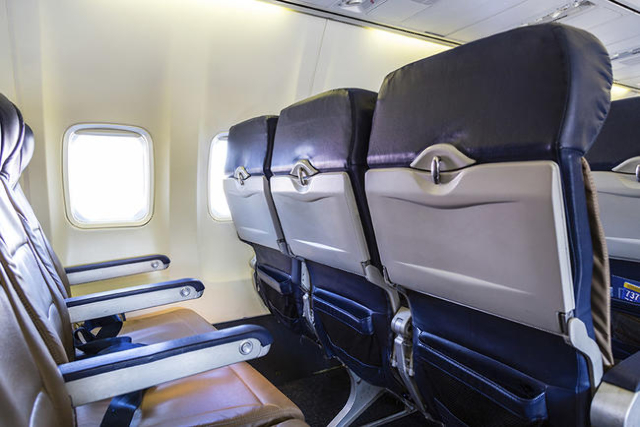How to stay healthy on a plane full of germs
During this time of the year, travel plans are on many of our calendars during the next few months and there is something that needs to be addressed in the planning process — GERMS!
The lion's share of travelers will drive to destinations over 50 miles to celebrate, but many will opt to fly. Today, I am addressing information from studies and research on airplane travel.
Airlines function as an ideal breeding ground for unwanted viruses, bacteria, and other unmentionables. But not to fear. Knowing the danger zones can help us battle these critters and avoid pitfalls.
Dr. Nina's What You Need To Know About Keeping Clean During Airline Travel
Why are germs an issue on airplanes?
Between the restricted space and scores of people flying in the same cabin for long periods of time, it's not surprising that airplanes are an uber-successful breeding-zone for germs. Additionally, the air is re-circulated throughout the cabin, thereby decreasing ventilation.
What do germs like?
In general, porous surfaces, such as leather and cloth, are especially inviting. Additionally, low humidity, as is often the case in an airplane cabin, can decrease our body's infection-fighting capability. Normally, our airways remain moist allowing the lining to trap germs so they cannot enter into our body. Dry air dries up mucus in our airways, and this permits germs to enter more easily.
What are areas of significant concern?
- Armrests: In addition to being porous, they boast plenty of passenger contact.
- Plastic tray table: While they may be intended for eating our food, they also double up as a great diaper changing station, place to stash chewed gum or discarded boogers. In addition, 60 percent of tray tables have been shown to test positive for MRSA, a deadly superbug. This is in comparison to only 11 percent of surfaces in New York subways.
- Seat pockets: One too many passengers use this area to discard their trash (fingernail clippings, dirty diapers). In fact, it has been likened to "reaching into someone's purse and rummaging through their dirty tissues, and gum wrappers." Yikes!
- Blankets and pillows: Most airlines provide fresh, washed ones each morning. However, later in the day, it is likely they have been used ... or drooled on.
- Seat belts: Porous material that is not typically cleaned, and everyone must handle and wear.
- Bathrooms: Swoosh! Studies have shown that the powerful flush sprays germs everywhere. And when you consider that there is one toilet available for 50-75 people, it is no surprise that it can be a danger zone.
- Water: Drinking from the sink or tank may be problematic. Opt for bottled water.
What are the airlines doing to keep airplanes clean?
In general, airlines have gone on record that they set their own standards without regulators and give instructions to their contractors. They use chemicals approved by aircraft manufacturers and conduct their own quality-control inspections. Further reports state that crews clean the plane during the overnight stay at an airport, replacing all pillows and blankets, daily. Every 30 days or between long distance international flights, a deep cleaning occurs; and every 18-24 months, an ultra-cleaning takes place.
What we can do to stay a little cleaner?
- Visit your doctor and get your flu shot. Holidays coincide with the flu season and that's why the Centers for Disease Control and Prevention (CDC), recommends a yearly flu vaccine for everyone six months of age and older as the most important step you can take to stay healthy. If you're traveling abroad, find out what vaccinations you need and if any special health notices are posted on the CDC destination list.
- Do not travel while sick or immune-compromised (chemotherapy, bone marrow transplants, illness).
- Use disinfectant wipes to wipe down tray tables and bathroom surfaces. Look for ones that are effective against MRSA. Because tray tables are in close contact with our food, which we will be ingesting, dirty surfaces can provide a direct and fast track into our bodies.
- Spritz spray sanitizer onto seatbelts and armrests
- Do not use seat pockets to store items such as water bottles, personal magazines, or smart phones. Instead, use your carry-on bag.
- Carry 60% alcohol hand sanitizer and apply prior to eating, after using the restroom, and intermittently.
- Do not walk barefoot inside the cabin.
- In general, it is wise to avoid touching our mouths, nose or eyes with our fingers. These body parts are lined with a specialized "mucus membranes" that can serve as "portals of entry" into our body.
- Staying hydrated keeps our airways moist, allowing germs to get caught in mucus and prevent it from entering into our bodies.
- Nasal sprays hydrate our nostrils in an otherwise dry environment. When mucus membranes are moist, they can trap bacteria.
- Bring our own blankets
- Wipe down luggage
Identifying pitfalls and danger zones can facilitate proper preparation and precautions that can help us combat germs and illness. As we make plans to fly "over the river and woods" there is plenty we can do to avoid airline germs and stay healthy during this season. There is a great saying that "travel is the only thing you buy, that makes you richer," and I agree – enjoy!
This article is for general information only and should not be used for the diagnosis or treatment of medical conditions and cannot substitute for the advice from your medical professional. Dr. Nina has used all reasonable care in compiling the current information but it may not apply to you and your symptoms. Always consult your doctor or other health care professional for diagnosis and treatment of medical conditions or questions.






















